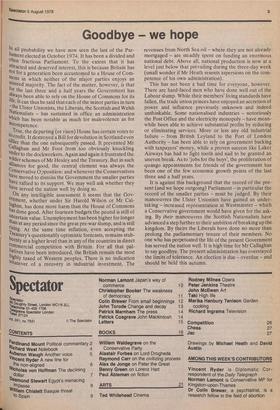Goodbye we hope
In all probability we have now seen the last of the Parliament elected in October 1974. It has been a divided and Often fractious Parliament. To the extent that it has attracted and deserved interest, this is because Britain has not for a generation been accustomed to a House of CornTalons in which neither of the nicajor parties enjoys an assured 'majority. The fact of the matter, however, is that for the last three and a half years the Government has always been able to rely on the House of Commons for its life. If can thus be said that each of the minor parties in turn the Ulster Unionists, the Liberals, the Scottish and Welsh Nationalists — has sustained in office an administration Which has been notable as much for malevolence as for Incompetence. . True, the departing-(or risen) House has certain votes to credit. It destroyed a Bill for devolution in Scotland even r,sulier than the one subsequently passed. It prevented Mr 'allaghan and Mr Foot from too obviously knuckling under to the dockworkers. Again and again it frustrated the Wilder schemes of Mr Healey and the Treasury. But in such adiances for good, the central element was always the Fonservative Opposition: and whenever the Conservatives 'Lave moved to dismiss the Government the smaller parties 'Lave rallied to its support. We may well ask whether they ilave served the nation well by doing so. On any intelligible assessment it seems that the GovThment, whether under Sir Harold Wilson or Mr Calh'aghan, has done more harm than the House of Commons as done good. After fourteen budgets the pound is still of Uncertain value. Unemployment has been higher for longer than at any period since the great pre-war slump, and is still At the same time inflation, even accepting the ireasury's questionably optimistic forecasts, remains stubbc'rrilY at a higher level than in any of the countries in direct e,9rnmercial competition with Britain, For all that palliatives have been introduced, the British remain the most highly taxed of Western peoples. There is no indication Whatever of a recovery in industrial investment. The revenues from North Sea oil — where they are not already mortgaged — are steadily spent on funding an enormous national debt. Above all, national production is now at a level just below that prevailing during the three-day week (small wonder if Mr Heath resents aspersions on the competence of his own administration).
This has not been a bad time for everyone, however. There are hard-faced men who have done well out of the Labour slump. While their members' living standards have fallen, the trade union princes have enjoyed an accretion of power and influence previously unknown and indeed unthinkable. Some nationalised industries — notoriously the Post Office and the electricity monopoly — have meanwhile been able to achieve substantial profits by reducing or eliminating services. More or less any old industrial failure — from British Leyland to the Port of London Authority — has been able to rely on government backing with taxpayers' money, while a proven success like Laker Airways has had to fight tooth and nail to be granted an uneven break. As to 'jobs for the boys', the proliferation of quango appointments for friends of the government has been one of the few economic growth points of the last three and a half years.
It is against this background that the record of the present (and we hope outgoing) Parliament — in particular the record of the smaller parties — must be judged. By their manoeuvres the Ulster Unionists have gained an undertaking — increased representation at Westminster — which a Conservative government would have given for the asking. By their manoeuvres the Scottish Nationalists have advanced a step further to their ambition of breaking up the kingdom. By theirs the Liberals have done no more than prolong the parliamentary tenure of their members. No one who has perpetuated the life of the present Government has served the nation well. It is high time for Mr Callaghan to say goodbye. The present administration has overstayed , the limits of tolerance. An election is due — overdue — and should be held this autumn.






























 Previous page
Previous page